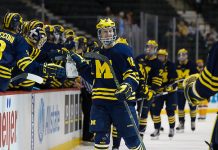Whenever I describe the Frozen Four to someone outside the college hockey world, I tell them that it’s not just a sporting event but a family reunion. The time I spend with my fellow USCHO writers, along with other college hockey media members like DJ Powers from Hockey’s Future, John “Jocko” Connolly of the Boston Herald and Minnesota-Duluth radio announcer extraordinaire Bruce Ciskie (just to name a few) are just as much of a highlight for me as the action on the ice.
Taking the family metaphor a bit further, we in the college hockey family always like to see one of our own succeed, which is why it’s been very exciting to see Canisius alum Cory Conacher write the beginnings of an NHL success story in the first week of the pro season, with three goals and two assists in his first three games for the Tampa Bay Lightning.
Of course, it’s still early — even in the NHL’s lockout-shortened 48-game season — but seeing Conacher make it as a pro gets me thinking back to his career with the Golden Griffins. More specifically, it gets me thinking about how, despite being a prolific scorer for Canisius, Conacher was never honored as a Hobey Baker Award finalist.
In 2010, only one player in Division I averaged more points per game than Conacher’s 1.51 (Maine’s Gustav Nyquist, 1.56), but Conacher was left out when the 10 Hobey finalists were announced.
Of course, as we discussed last week, the Hobey can be a bit of a numbers game (although at the finalist stage, the coaches are voting, which can allow for intangibles to play a greater role), but Conacher is hardly the first high scorer out of Atlantic Hockey to be on the outside looking in at Hobey finalist time. Former Mercyhurst forward Dave Borrelli comes to mind, with a national-best 1.55 points per game as a senior in 2005-06 and no Hobey love to show for it. So does former Robert Morris forward Ryan Cruthers in 2007-08 (although in fairness, Rochester Institute of Technology’s Simon Lambert did get a finalist nod in 2008).
It’s always tricky to figure out how the Hobey vote will treat candidates out of Atlantic Hockey. The conference has gained a measure of respect in recent years through some outstanding performances by conference champions in the NCAA tournament (Holy Cross, RIT and Air Force being the most successful), and the conventional wisdom is that while the conference may not have the top-to-bottom depth of a major conference, the conference champion is a strong team that is not to be taken lightly. I think that’s pretty much right on the money, and while that’s great to keep in mind at tournament time, that top-to-bottom depth makes it tougher to evaluate Hobey candidates out of the conference.
I should note here that when I say “Hobey candidates,” I really mean “Hobey finalist candidates.” I was definitely in favor of Eric Ehn winning the Hobey in 2007 — he had a great season, and I thought it would have been a great testament to Hobey Baker’s legacy — but on the whole, it goes back to my past comparisons to the Oscars: Just as “the nomination is the win” for certain movies and actors at the Academy Awards, a finalist berth is a victory for a number of players, including most candidates out of Atlantic Hockey.
Of course, some top Atlantic Hockey players, including Conacher, haven’t gotten that finalist berth, and while every year is different and no Hobey candidate exists in a vacuum, I can’t help but think that issue of top-to-bottom conference depth creates some confusion as to how legitimate some candidates’ numbers can be, and whether they’re the product of competing against lesser competition. In retrospect, I think it’s safe to say that Conacher was as legit as they come when he lit up Atlantic Hockey in 2009-10.
But that’s the past, and this is really supposed to be about this year’s Hobey candidates, so why am I writing all this about Conacher now? Well, this is all a very roundabout way of coming around to Brett Gensler from Bentley. When this season’s Hobey Watch Blog started, it was Gensler, not Johnny Gaudreau, who had the highest points-per-game average in the country (although Gaudreau is now blowing away the field with 1.72 PPG), and at present, he’s third with 12 goals and 19 points in 21 games (1.48 PPG, a shade behind Nebraska-Omaha’s Ryan Walters’ 1.50).
He’s also been fairly consistent, having been held off the score sheet in only five games this year. Granted, two of those games were against Harvard and Dartmouth, but with a goal and an assist against Michigan, a goal against Massachusetts-Lowell and two assists against Northeastern, Gensler has been productive against the better teams on Bentley’s schedule.
Overall, I think we are getting to a point where people have the same understanding about the top players in Atlantic Hockey that they do about the top teams in Atlantic Hockey: The conference may not have the depth of the WCHA or the CCHA, but those top players are legit. The Hobey finalist nod awarded to Air Force’s Tim Kirby last year — a first for an Atlantic defenseman since Quinnipiac’s Reid Cashman in 2005 — certainly contributes to that assessment.
My instinct is that players whose teams aren’t at the top of the conference might suffer more in Atlantic Hockey than in other conferences when it comes to the Hobey voting (Canisius finished fifth in 2009-10), so Bentley might need a stronger team performance in order for Gensler to get a finalist berth. I’m not saying the Falcons need to overtake Niagara — the Purple Eagles have been nearly untouchable in their conference, after all — but given the current conference standings, with one game separating second and seventh place, a strong second half for Bentley will help Gensler’s Hobey bid immensely … not to mention the Falcons’ position for a postseason run and a shot at the Atlantic Hockey championship, which I’m sure is more important to Gensler anyway.
One final thought for this week: Thinking about how different conferences are evaluated with regard to the Hobey gets me thinking about what things will be like next year, when the conference realignment hits and we have two new conferences in the Big Ten and the National Collegiate Hockey Conference, the end of the CCHA and a vastly different WCHA. It will be interesting to see how the new-look WCHA is treated and how it will compare to, say, ECAC Hockey.
I’ll tell you this, though. My favorite thing about conference realignment?
No more whining about how Miami doesn’t play anyone.


